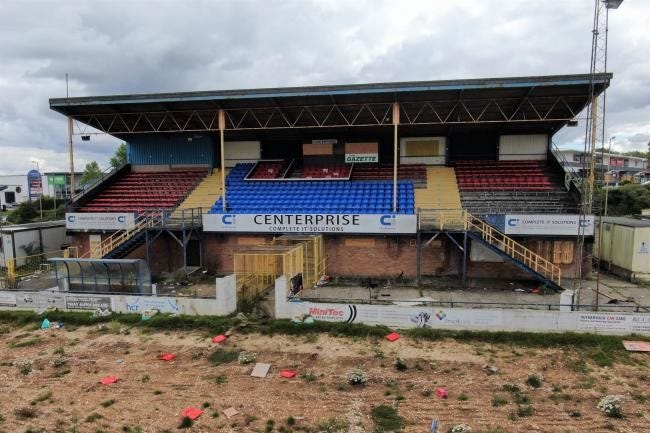Football’s back, but its soap opera has never been away. Lionel Messi bids a teary if lucrative farewell to Barcelona, Harry Kane lobbies for a move to Manchester City but is beaten to the Etihad by England’s first £100 million player. Meanwhile, lowly Basingstoke Town FC begins a third season in exile from its home of over 70 years.
In the short gap between the end of the Euros and the start of the 2021/22 season, former sports minister Tracey Crouch published the preliminary findings of her review into the governance of English football. The headline was a call for an independent regulator. A nice idea if you (quite understandably) assume that the FA will never get its act together to fulfil its obligations as the sport’s governing body. Hard though to see just how much effect this could have in practice.
I remember Crouch as a track-suited super fan at the Rio Paralympics in 2016, ever eager for yet another selfie with the GB athletes. She really showed her mettle, however, in the manner of her leaving her ministerial post at DCMS two years later. She resigned in protest at government delays in implementing the recommendations of her review into the damaging social effects of bookmakers’ fixed-odds betting terminals.
Any owners of professional teams hoping that her call for tighter policing of financial and ownership rules, plus more fan engagement in the way clubs are run, will fade away are likely to be disappointed. As well as proven tenacity, Crouch has strong football credentials, and no need to curry favour with anyone other than her parliamentary constituency’s voters.
It is often said that football without fans is nothing. It is no exaggeration to say that a number of clubs would not exist today had it not been for the activism of their fans in driving positive change. Its fans are a strength of our national game that should be both cherished and nurtured. Tracey Crouch
The challenge is that clubs are private businesses as well as social assets, and fans are hungry for success on the pitch as well as for the protection of football’s heritage. Outrage at imprudent financial management tends only to come when a crisis engulfs a club. Would greater fan involvement temper the over-enthusiasm of owners gambling on success? Or could it have the reverse effect, goading them on to take greater risks?
Expect, then, a regulator with limited powers, a framework for consultation with supporters (cue heated debate about which fans - season ticket holders, casual attendees, streaming video subscribers, Instagram followers?) and some protection of the core essence of clubs - in particular their grounds.
The most egregious examples of financial mismanagement tend to involve clubs’ property assets. At Crystal Palace the separation of ownership of the club from the freehold of its ground was the precursor to collapses into two periods of administration and misery for us fans. If an independent regulator could achieve one thing only, the unbreakable binding of clubs to their grounds, then the establishment of this body should be pursued with vigour.
A couple of years back I met the guardians of the soul of Basingstoke Town FC, a non league club now in level eight of the football pyramid, playing in the Isthmian League South Central Division. Theirs is a cautionary tale for any club at any level whose stadium asset is worth more in redevelopment value than it is as a football ground. They wanted to shout about their plight, but couldn’t make their voices carry far given their team’s minor status in the footballing hierarchy.
Basingstoke is said to be England’s largest town without a football club in the top four divisions. Now Basingstoke Town is playing at a temporary home, the club’s previous owner shutting the turnstiles at its Camrose ground in pursuit of residential redevelopment gains.
The Camrose pitch has been ploughed up in anticipation of the erasing of Basingstoke’s physical history. Meanwhile, mustering whatever publicity and political leverage they can, the supporters battle on either to return to the club’s spiritual home, or find a new one worthy of its 125 year history.
Find out more about 'Save the Camrose' here
As I applaud the Crystal Palace team onto the pitch at our first home game of the season, I’ll give thanks for ownership of our stadium being reattached to the club, and I will spare a thought for the Basingstoke Towns of the footballing world.
Back for good
Whatever complaints fans might have about the management of the clubs they support, they should take pride in the community work of their associated charities. I am biased as chair of the Palace for Life Foundation, but I make no apology for highlighting the £100 million a year that the Premier League invests into community programmes, including those run by Palace for Life. The EFL’s own charitable trust calculates that almost 900,000 people take part in programmes run by EFL clubs’ charities each year. I’ll look at football’s community work in a future edition of Sport inc. For now, though, have a look at the website of the charity at your own club. No doubt you’ll find stories like this one:




